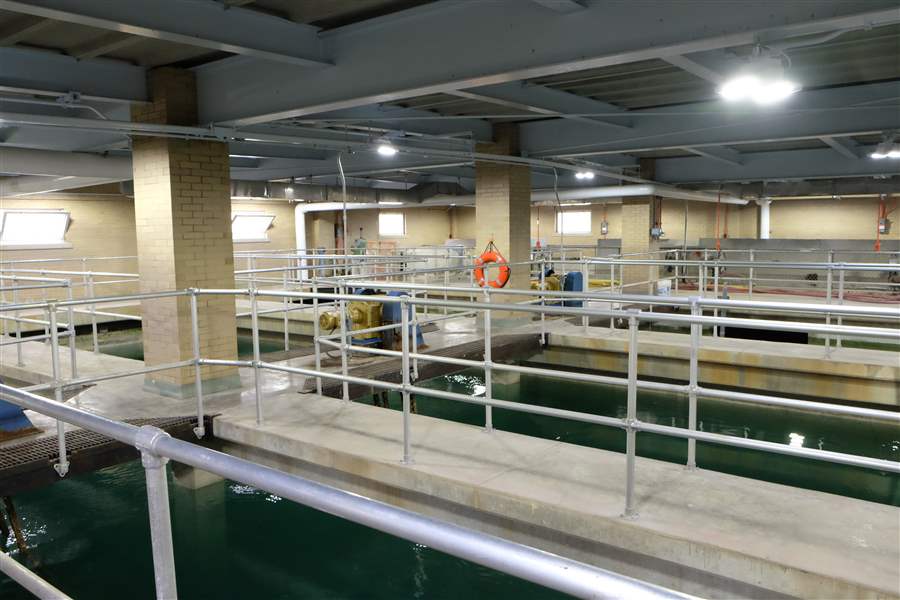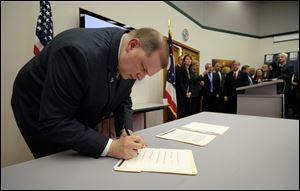
Toledo would own Collins Park Water Treatment Plant with new proposal
4/9/2018
A view inside the Collins Park Water Treatment plant.
THE BLADE
Buy This Image

Toledo Mayor Wade Kapszukiewicz and leaders of the suburban communities that buy its water sign a memorandum of understanding to form the Toledo Area Water Authority Wednesday, January 31, 2018 at the Toledo Chamber of Commerce office.
Mayor Wade Kapszukiewicz and his suburban counterparts could reach a regional water deal that would keep the Collins Park Water Treatment Plant under Toledo ownership.
The new scenario, proposed by Mr. Kapszukiewicz, contrasts sharply with an existing framework for a regional water authority but could perhaps be more palatable to Toledo voters.
In January, leaders from Toledo, Lucas County, Maumee, Perrysburg, Sylvania, Whitehouse, Fulton County, Monroe County, and the Northwestern Water and Sewer District signed an agreement pledging their intent to together form the Toledo Area Water Authority. That agreement outlined plans that included Toledo selling or leasing its water treatment plant to TAWA, something suburban leaders pushed for so that all ratepayers would have an ownership stake in the system.
But the prospect of Toledo losing sole ownership of the water system was met with vocal opposition from residents led by former Mayor Carty Finkbeiner, who argued the city would be giving up too much control of the utility.
Mike Beazley, senior policy adviser to Mr. Kapszukiewicz, said Monday that the administration has been working with some of the suburban mayors to come up with an “alternative path” to regional water without transferring ownership of the plant. The parties also are looking at whether forgoing the plan of creating TAWA as a political subdivision would save on startup costs, he added.
“We’re exploring those things,” he said. “We’re in the process of a series of meetings that we think can achieve those things, and we’re hoping to, within the next couple of weeks, be able to turn a corner on something that achieves those objectives.”
Sylvania Mayor Craig Stough, who has been pushing to establish a regional water authority since Mr. Kapszukiewicz’s predecessor Paula Hicks-Hudson was in office, said he met with Toledo’s mayor last week to discuss the alternative proposal.
A year ago he was adamant that suburban water customers have an ownership stake in the water treatment plant, but he has since softened his stance in favor of regional cooperation.
“I am willing to go down any path that might lead to a regional water authority, and if we can do it with Toledo retaining ownership of the plant, then that’s certainly acceptable to me,” he said.
Mr. Stough added that he won’t agree to Toledo’s latest proposal unless three requirements are met:
• Toledo and its suburbs all must pay the same wholesale rate for water, and that rate must be based on the actual cost of production.
• Water rate contracts must be continuing agreements that cannot be changed unilaterally.
• A second water source must be identified, and water pipes from Toledo must connect to backup sources such as those in Oregon, Bowling Green, or Detroit.
Because the alternative plan likely would not require formation of a political subdivision, as was the plan for TAWA, it may not have an appointed governing board. Mr. Stough said he anticipates there would be some sort of committee or board that would determine water rates, but how that could be structured is far from pinned down.
“Anything that could lead to a regional water system that works for all of us is acceptable, but we have to make sure the details really do work for all of us,” he said.
Mr. Finkbeiner said he is pleased that Mr. Kapszukiewicz has reopened dialogue with suburban leaders and he looks forward to hearing more about the new proposal. He reiterated his position that Toledo “absolutely” must retain plant ownership and said the city also must have a majority vote on whatever body would govern the regional system.
“The city must retain, as long as it owns the facility and has been the primary investor in the facility, a majority vote on the board,” he said. “That is not debatable.”
Mr. Beazley said any change to the way Toledo sells its water likely will need a vote from its citizens, something the Kapszukiewicz administration previously ruled necessary to establish a regional water authority.
Sylvania, Maumee, and Perrysburg all are continuing to look at other options to purchase water as discussions with Toledo continue.
Maumee Mayor Richard Carr said the next step for his community will be to crunch the numbers and see which scenario will lead to the most affordable rates for Maumee residents. If partnering with Toledo under Mr. Kapszukiewicz’s plan is more affordable than buying water from Bowling Green, then he said he’s inclined to participate.
“If there’s a significant cost difference, our council will have to make that decision,” he said.
Mr. Carr said he is going into discussions about the alternative plan with an open mind, but he isn’t sold on the idea of Toledo retaining sole ownership of the Collins Park Water Treatment Plant.
“It’s hard to explain to your residents that you’re going to be paying for $500 million of improvements, yet we’re still paying market rate for water and we’re not owning the facility in the end,” he said.
Contact Sarah Elms at selms@theblade.com, 419-724-6103, or on Twitter @BySarahElms.